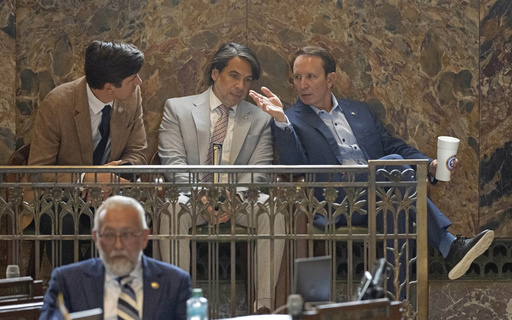BATON ROUGE, Louisiana — On Thursday, Louisiana legislators decided to delay a crucial vote on a significant component of Governor Jeff Landry’s extensive tax reform initiative. Most of Landry’s suggested legislation, which aims to implement around $2 billion in tax reductions for both individuals and corporations, has been progressing effectively through the House of Representatives during this third extraordinary legislative session of the year. However, there has been noteworthy opposition regarding a proposed sales tax applied to numerous services, such as mowing lawns, receiving tattoos, and using coin-operated laundry machines.
The postponement of the bill, which was projected to generate approximately $500 million to address the revenue shortfall created by the tax cuts, casts doubt on Landry’s ability to gather sufficient support. With a Republican majority, the House requires the backing of 70 out of its 105 members to successfully pass the bill. “I think the bill is on life support if it isn’t dead already,” remarked Republican Representative Joe Stagni.
After leaving the House chamber on Thursday night, Landry refuted claims that there weren’t enough votes for the bill’s approval. “Don’t ever go in the kitchen halfway through the meal being cooked; judge it once it’s cooked,” he stated. Representative Julie Emerson, who has taken the lead on several of the tax reform measures, noted that some lawmakers opposed the overall tax increase on services, while others objected to specific items being taxed.
In committee discussions, various lobbyists expressed concerns that taxing the proposed services, including property maintenance and repairs, would increase costs for small businesses and drive up insurance rates. Nonetheless, the House voted 71-23 to make a temporary 0.40% sales tax increase permanent, while slightly reducing the overall sales tax rate to 4.40% by eliminating 0.05%. Notably, household groceries would remain exempt from this tax increase. This expansion of the sales tax is anticipated to generate around $820 million annually.
“For sales tax, individuals have a choice,” noted Republican Representative Mark Wright, who introduced the increased sales tax legislation. “With income tax, there is no choice.” Some fiscal conservatives expressed their opposition to the new sales taxes on services, evidenced by a few Republican members who voted against making the increased sales tax permanent. Furthermore, some Democratic lawmakers argued that expanding the sales tax would disproportionately impact lower-income families.
According to studies from the Institute on Taxation and Economic Policy, Louisiana has one of the most regressive tax systems in the country, with lower-income households contributing a greater share of their income towards federal and state taxes compared to wealthier families. A research effort funded by a coalition of unbiased economic policy groups suggested that the proposed reforms could lead to a small improvement in the progressivity of the existing system, but it did not account for possible rises in local sales taxes.
Landry maintains that his tax reform strategy is influenced by policies made in states like North Carolina and Texas, claiming they are economically outperforming Louisiana. He insists that the successful passage of this tax reform package will position Louisiana as a more enticing location for businesses responsible for creating jobs. Supporters highlight that the Tax Foundation, a conservative research organization, ranks Louisiana as the 40th state in tax competitiveness.
Concerns have also been raised by some lawmakers regarding the feasibility of effectively enforcing the proposed taxes on a diverse array of services. Republican Representative R. Dewith Carrier, who represents several parishes in southwest Louisiana, pointed out in a recent committee hearing that he doubted his constituents would comply with the new sales tax regulations. “Don’t count on my district to do it; those guys deal in cash and will trade it for a bottle of vodka or food stamps,” he remarked.
On Wednesday, the House enacted a bill that reduces the corporate income tax rate from 7.5% to a flat rate of 3.5%, alongside an additional bill that imposes new taxes on digital products and services, such as streaming platforms, projected to contribute around $40 million annually. Additionally, they passed measures to eliminate the 0.275% corporate franchise tax — valued at more than $500 million in yearly revenue — as well as to streamline the individual income tax to a 3% rate, which would diminish state revenue by approximately $1.3 billion.
The House is set to reconvene on Monday to vote on the tabled proposal for expanding sales taxes on various services.




